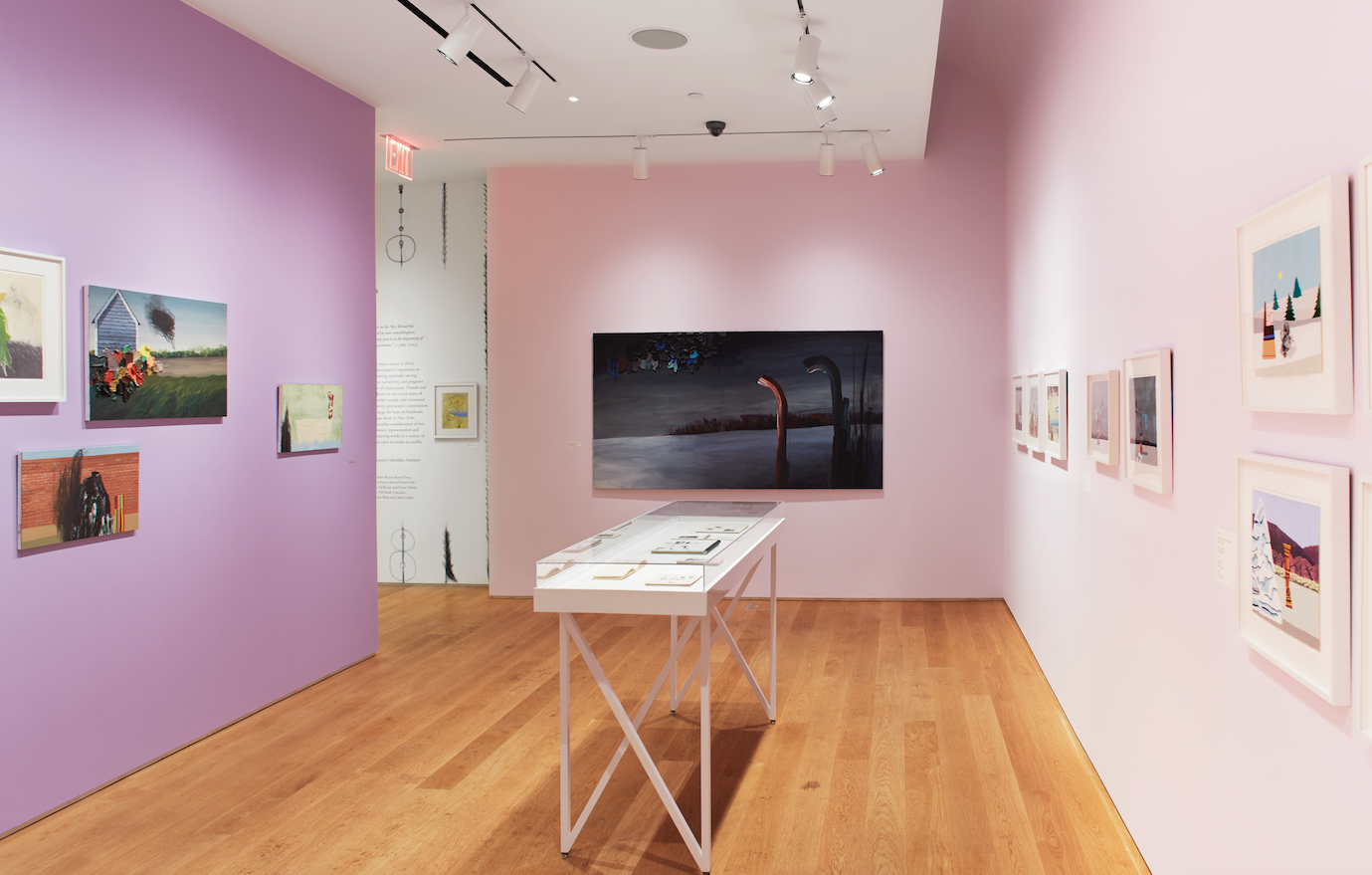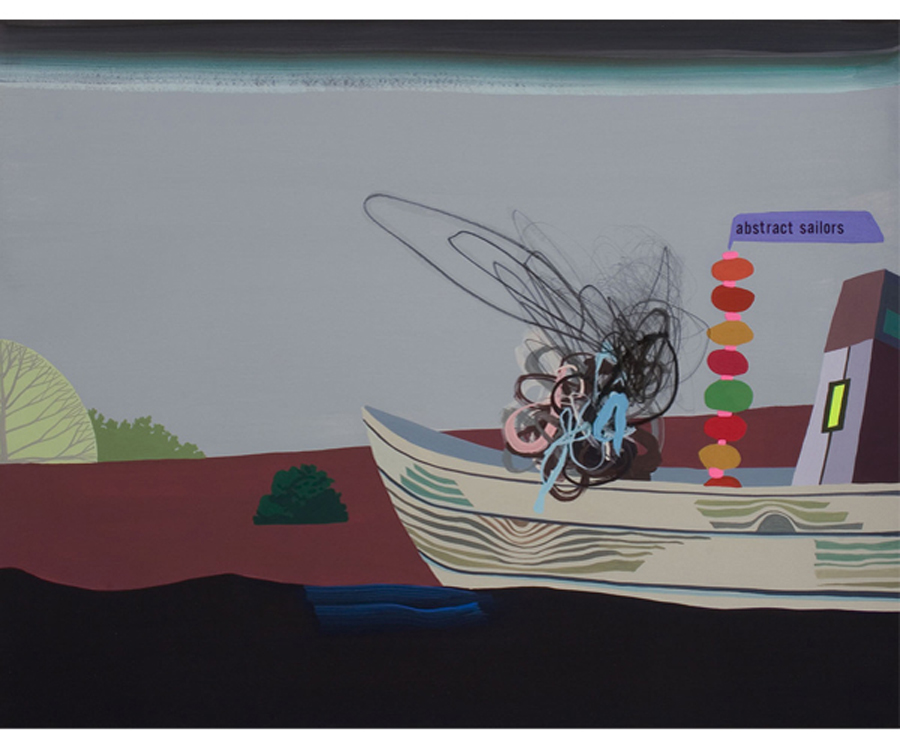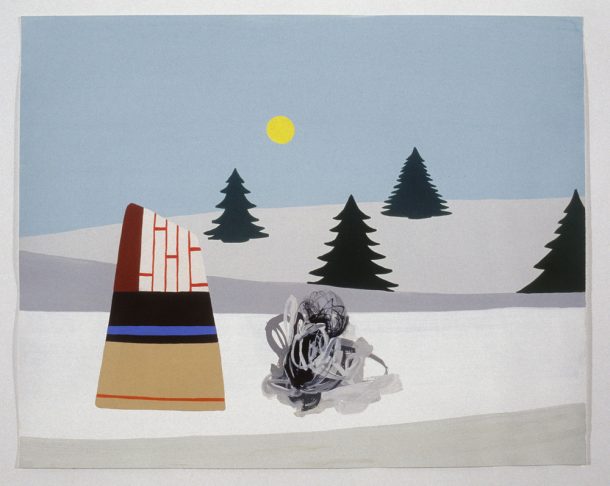On view from October 12, 2018 to February 3, 2019 in the Drawing Room, Jennifer Wynne Reeves: All Right For Now presents the late artist’s work, at the intersection of representation, abstraction, and text. From the late 1990s until her too-early death from brain cancer in 2014, Jennifer Wynne Reeves (b. 1963, Royal Oak, MI) developed a reputation as an artist’s artist, garnering an intense and loyal following especially among fellow artists who appreciated her ability to load errant scribbles and globs of crusty paint with humor, narrativity, and poignant emotional affect. As an early adopter of Facebook as a platform for connecting not just with friends but with an audience, Wynne Reeves gained a large fan base through her pensive writings, often accompanied by one of her images. In the new exhibition catalogue Drawing Papers 139: Jennifer Wynne Reeves All Right for Now, a selection of these writings accompany essays on the artist and reproductions of her drawings, paintings, and notebooks.

Installation view: Jennifer Wynne Reeves: All Right for Now, The Drawing Center, New York.October 12, 2018 – February 3, 2019. Photo: Martin Parsekian.
The below writings represent just some of Wynne Reeves’ contemplations on art, love, and originality.
Attempting to make original visionary art is like robbing a bank. You might get away with it but probably won’t… unless you’re a Robin Hood or an artist. To paint is to steal away the revelations of head and heart while banking on the poverty that is you, It’s a crazy endeavor, likely lost, but lunacy has a way of seeing possibilities breaking through the cracks of doubt. And no cement can stop that flower.
— Jennifer Wynne Reeves, Facebook, November 6, 2009
Jennifer Wynne Reeves, Abstract Sailors, 2005. Gouache on paper, 11 x 14 inches. Private Collection.
For many artists questions of existence are woven between questions of composition. A line isn’t just a line and a color isn’t just a color. They’re tributary to something larger than themselves, they flow into another bigger river called composition, a chosen road taken to an unknown end. But, just like love, just like life, just like death, sometimes you get pushed down a road you don’t want to go.
— Jennifer Wynne Reeves, Facebook, April 29, 2011
Jennifer Wynne Reeves, Mondrian Guy and Expressionist Guy Take a Walk, 2005. Gouache and pencil on paper, 11 x 14 inches. Private Collection, New York.
Picasso didn’t paint his lovers. He painted his perception of his lovers, no, not quite. He painted love itself. He painted different types of love. Sex-love, Mother-love, Sad-love, Tortured-love, Peace-love, Aging-love, Penis-love but, but not divine Love. That was Matisse’s area and maybe why he was so drawn to him and vice versa. Still, I think there’s something divine about his line, anyway. Okay, I take that back. He did paint divine Love. It’s in the guitars, the love of art.
<p></p>
I know he was a self-professed atheist. He refused to go to Matisse’s chapel but years after Matisse died he did go. The receptionist gave him an envelope. It was a letter from Matisse. It said something like, ‘I knew you believed.’ Those two men, those two artists, had a rapport. It didn’t matter what side they were on, what name they used for love, God or not. It didn’t matter. That’s what art can do. That’s why I put my love there and I suspect I’m not the only one.
— Jennifer Wynne Reeves, Facebook, April 27, 2011
If any and all emotion cannot be expressed, no matter how irrational, in art and in life, then you might as well be in a bad relationship with a guy who’s always telling you to calm down because you stubbed your toe and said, “ow!”. True, there could be some moments when you may lie and say “Oh, no, that didn’t hurt at all. Thank you for asking,” but, overall, emotional honesty is paramount. Without it, all the morality in the world is a falsity. So let’s here [sic] it for emotional honesty in art — we need all the practice we can get and then some.
— Jennifer Wynne Reeves, Facebook, February 5, 2010
<p> </p>
To read more of Wynne Reeves’ writing, explore the Jennifer Wynne Reeves All Right for Now exhibition catalogue on issuu.


